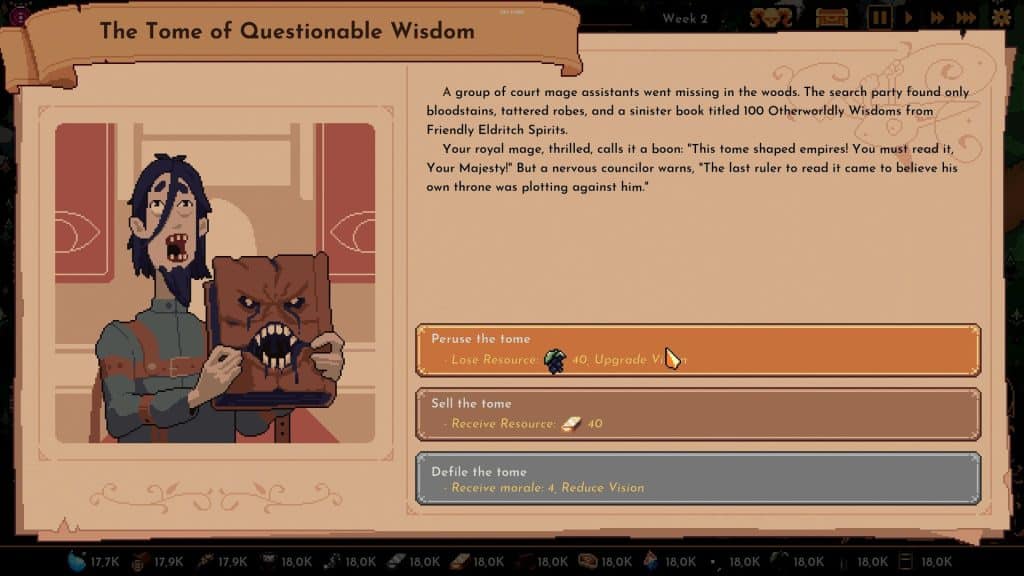Roguelikes continue to be ever-present on Steam’s front page. No matter the Roguelikes remain ever-present on Steam’s front page. No matter the genre, a few teams are hard at work finding a way to present a randomized vision that combines gradual progress with dynamic gameplay. The King is Watching does this for a few different genres at once, combining elements of tower defense and base building with a grab bag of other strategy mechanics. The blend is immediately enticing and initially pretty fun. That fun unfortunately wanes after its initial hours, a problem that many roguelikes stumble over on their way to greatness.
(Content Warning in the above trailer for annoying fake gamer chat)
Here’s what everyone is buzzing about. The King is Watching presents players with a strategy game where the buildings themselves are collectable. The resources and troops you generate all come from various buildings you acquire as rewards from victorious battles or random events that pop up every so often. So, one run could rely on an army of undead skeletons while another could see a legion of madmen escaping from the sanitarium you constructed right next to the crystal mine. It’s all up to Lady Luck, and that in itself could make for an appealing game. Of course, that’s not all this game has to offer.
As the title might suggest, The King is Watching‘s central mechanic is that you are not playing as an omniscient deity. You are a king who can only micromanage your kingdom so much. Your gaze is represented by a small box that overlays your buildings. Only buildings within the box are active. Players quickly learn that this means splitting their time between resource production and troop production, although finding a mix between the two is possible for those who really enjoyed Tetrising their guns into their inventory in Resident Evil 4.

In addition to the inherent limitations of your king’s eyesight, players also must contend with the small size of their kingdom. You can’t build everything you acquire, and some resources will only pop up occasionally in the pool of available buildings. Your bumblebee warrior-producing flower patch will be useless if you haven’t already stocked up on grapes, and your swordsmen will have nothing to swing if you don’t invest in ore. It’s entirely possible to roll three buildings that just don’t work for you in a run as a reward. A few of those rolls can pull the rug out from an otherwise well-oiled machine and end a run cold.
The size of your gaze can upgrade during the run, as can the size of your army. However, the size of your kingdom is one of numerous gameplay features that are only unlockable from The King is Watching’s roguelike progression between runs. Each unsuccessful attempt at reaching the final boss nets you coins that you can spend on an upgrade tree that starts affordable before almost immediately requiring an intense grind to unlock anything. I believe that you should be able to snag at least one meaningful perk after most runs in games like this, but The King is Watching does not share my opinion in the slightest.

It’s not like the runs in The King is Watching are quick, either. You will almost certainly spend a half hour building up your kingdom and watching your army slowly overtake forces you know you can conquer before inevitably falling to a boss you know you can’t beat. It’s not respectful of the player’s time, and the enemy variety doesn’t expand wide enough to make it feel like you’re facing off against new foes each time you sign up for another excursion. Instead, it feels like you’re hitting a game over and starting from scratch.
At their best, roguelikes are all about systems that can be broken, but it doesn’t feel possible to hit that miracle game-breaking run in The King is Watching. Early on, the way the resources gate your progress makes it so that everything has to build on everything else, and you’ll hit the same milestones no matter what type of troop or resource you’re focusing on. This is all sound logic for a regular strategy game, but it makes for a poor roguelike experience all the way around.

Most disappointingly, some of the temporary upgrades offered in each run are straight-up unusable without first unlocking core features of the experience from the roguelike progression, something that is a real downer when you’re new to the experience and looking to see how expansive the game is. I don’t want to have to play for hours to unlock one of my king’s three abilities just to use a random boost artifact, especially when I didn’t even get to choose my king in the first place, since there’s only one unlocked from the start.
The King is Watching Final Thoughts
So yes, The King is Watching makes a great first impression, but that’s about all it has going for it. The game’s crippling flaw is featuring mobile game progression in a PC game wrapper, and it’s just not worth anyone’s time. Unless you’re prepared to dedicate hours upon hours to unlocking core features of this experience, there are better kingdoms to conquer out there.
The King is Watching was reviewed on PC via Steam with a code provided by the publisher.






